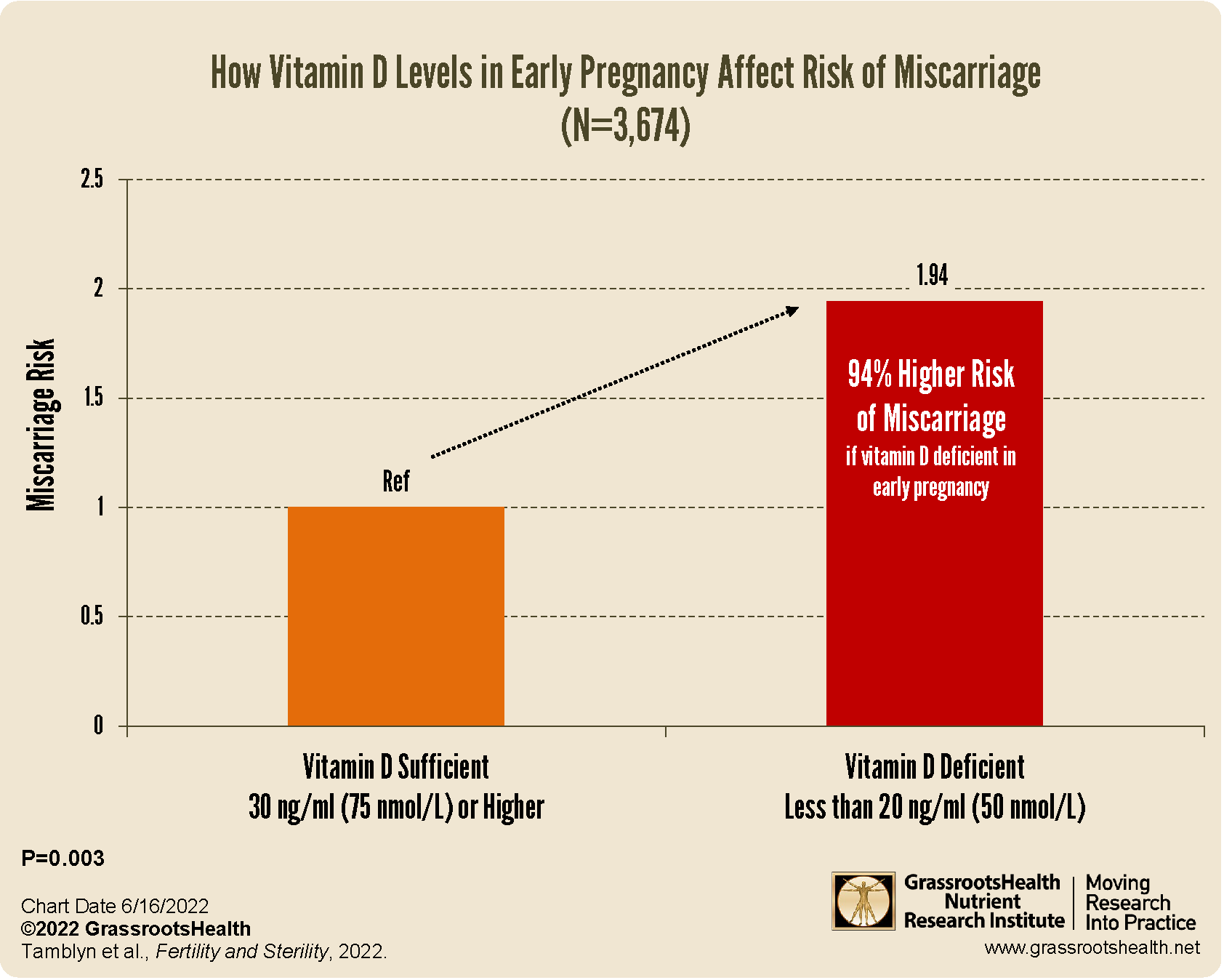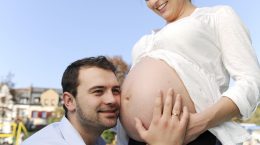Published on June 17, 2022
Vitamin D deficiency found to increase risk of miscarriage by 94% and increase risk of recurrent miscarriage 4 times; vitamin D deficiency among male partners can also contribute to risk
Key Points
- Compared to women whose vitamin D levels were sufficient at the beginning of pregnancy, women who were vitamin D deficient had a 94% significantly increased risk of miscarriage, and women who were either deficient or insufficient had a 60% significantly increased risk of miscarriage
- Pregnant women who were vitamin D deficient were 4 times more likely to have recurrent spontaneous abortion compared to those who were not vitamin D deficient
- Another study showed that the pregnancy rate per patient and per cycle, as well as delivery rate per patient and per cycle, were all significantly higher among the couples whose male partner had a higher vitamin D level compared to the lower vitamin D; there was a 3 times higher chance of pregnancy when the male partner had a vitamin D level of at least 30 ng/ml (75 nmol/L) compared to males with levels below 30 ng/ml
 Vitamin D is necessary for all stages of the life-cycle, and is especially important during pregnancy. Numerous studies have found that higher vitamin D levels during pregnancy reduce the risk of adverse maternal and infant outcomes. It is also likely that vitamin D is involved in the process of conception, implantation and the development of the placenta, as vitamin D deficiency is also linked with infertility.
Vitamin D is necessary for all stages of the life-cycle, and is especially important during pregnancy. Numerous studies have found that higher vitamin D levels during pregnancy reduce the risk of adverse maternal and infant outcomes. It is also likely that vitamin D is involved in the process of conception, implantation and the development of the placenta, as vitamin D deficiency is also linked with infertility.
Miscarriage Risk 94% Higher if Vitamin D Deficient
A new 2022 meta-analysis by Tamblyn et al. included data from 10 studies with a total of 7,663 women to assess the predictive value of vitamin D status on miscarriage (loss during the first or second trimester) and recurrent miscarriage. Vitamin D levels taken during the first or early second trimester (latest around 14 weeks) were used for the analysis; one study also measured preconception vitamin D levels. Vitamin D deficiency was defined as less than 20 ng/ml (50 nmol/L), insufficiency as 20-30 ng/ml (50-75 nmol/L), and sufficiency as at least 30 ng/ml (75 nmol/L).
The analysis found that, compared to women whose vitamin D levels were sufficient
- women who were vitamin D deficient at the beginning of pregnancy had a 94% significantly increased risk of miscarriage
- women who were either deficient or insufficient had a 60% significantly increased risk of miscarriage
Among the women whose preconception vitamin D levels were measured, higher preconception vitamin D was associated with a 12% reduced risk of pregnancy loss.
The authors concluded that “Vitamin D deficiency and insufficiency are associated with miscarriage.”
Recurrent Spontaneous Abortion 4 Times More Likely with Low Vitamin D
Recurrent spontaneous abortion, or recurrent miscarriage, is defined as two or more successive pregnancy losses; usually, the loss occurs prior to 20 weeks from the last menstrual period. Another 2022 meta-analysis by Chen et al. looked at data from 14 studies to determine the association between vitamin D level and the occurrence of recurrent spontaneous abortion (RSA). Based on the analysis, pregnant women who were vitamin D deficient were 4 times more likely to have recurrent spontaneous abortion compared to those who were not vitamin D deficient.
Vitamin D Level of Male Partners Affects Pregnancy Success Rate
Another study looking at pregnancy success and vitamin D levels among male partners showed that the pregnancy rate per patient and per cycle, as well as delivery rate per patient and per cycle, were all significantly higher among the couples whose male partner had a higher vitamin D level compared to the lower vitamin D. In fact, there was a 3 times higher chance of pregnancy when the male partner had a vitamin D level of at least 30 ng/ml (75 nmol/L) compared to males with levels below 30 ng/ml. There was also a tendency towards a higher rate of miscarriage in the group with lower male vitamin D levels, although this particular finding was not statistically significant.
Toxic Elements Can Also Increase Miscarriage Risk
During pregnancy, toxic elements such as lead stored in bones can be released and passed from the mother’s body to the baby which may result in miscarriage, premature birth, low birth weight, learning or behavioral problems, or damage to the baby’s brain, kidneys, or nervous system. Cadmium is another toxic element that can also accumulate in the kidneys and thyroid gland, and can contribute to thyroid issues, kidney disease, infertility, uterine fibroids, and other reproductive tract diseases if the build-up is high enough.
Take steps for your own reproductive health by ensuring optimal vitamin D levels and testing for essential and toxic elements – for your family and loved ones as well – by measuring at home today.







